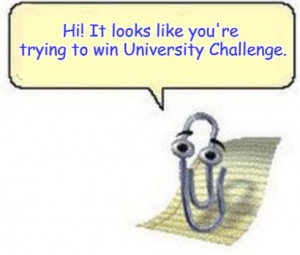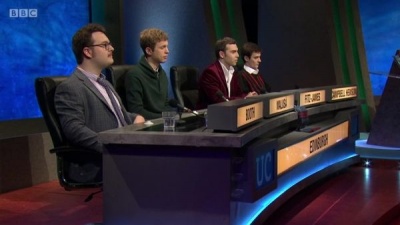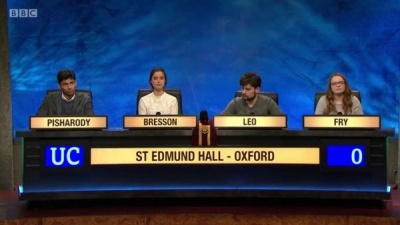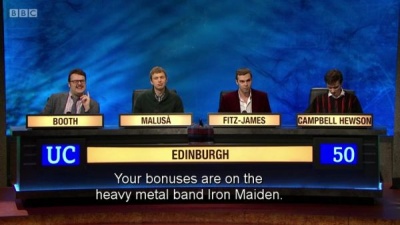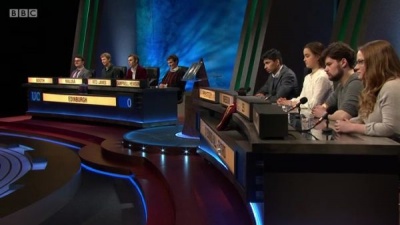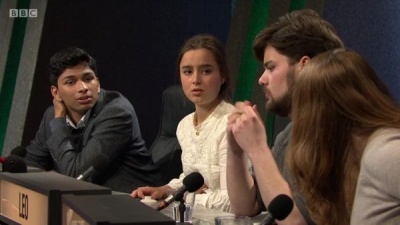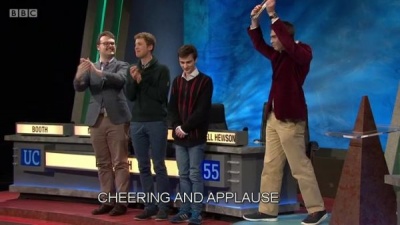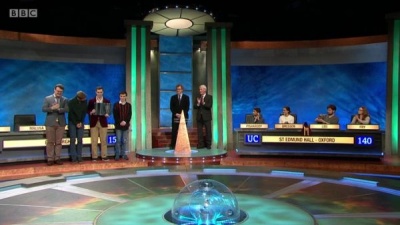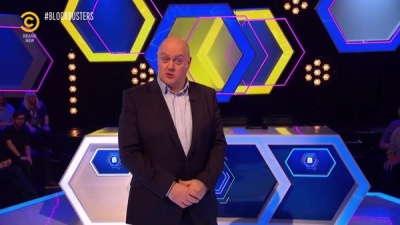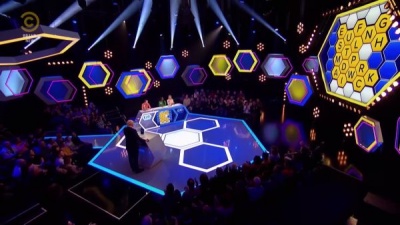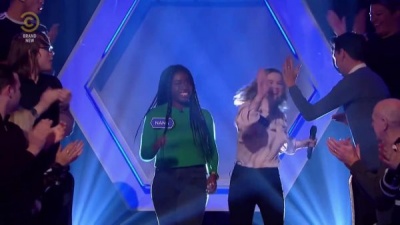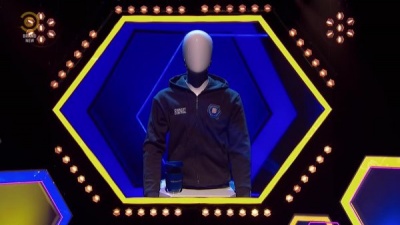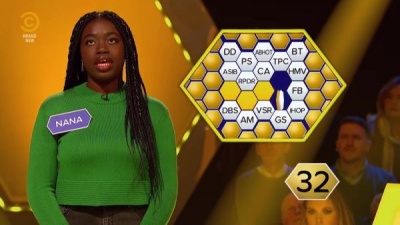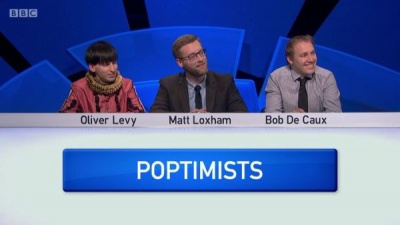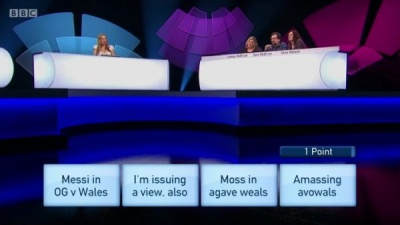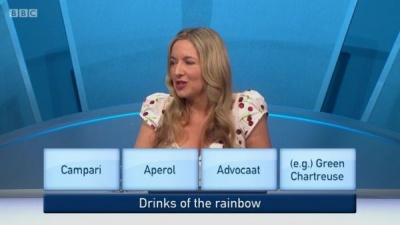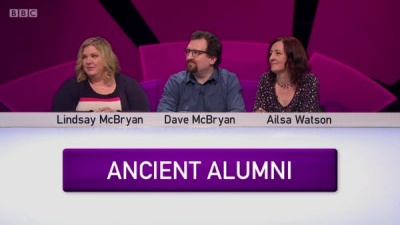Weaver's Week 2019-04-28
Last week | Weaver's Week Index | Next week
Coming up, we try to shout in the direction of Dara Ó Briain, "That's lacklustre!".
But first, a message from Stationery World of Fun.
Contents |
University Challenge
Granada for BBC2, 22 April
Edinburgh and St Edmund Hall Oxford are bidding to become the 25th champion side of University Challenge in the BBC revival. Odd how this fact hasn't been mentioned by the BBC or Granada press offices, both are usually very good at landmark anniversaries. Maybe they're waiting for the 50th student champion side in two years time.
Edinburgh might have turned up in their smoking jackets, but that doesn't stop them from picking up a missignal penalty on the opening question. Oxford pick up the question, and grab bonuses on paperclips. "Could it be the Netherlands?" "No, Marcelline Bresson would have said." The team knows itself.
A series on famous works of fiction provide this column with the one question we get right all night. The question-setters cause eyebrows to rise when they say "About the size of Belgium...", forgetting that the International Standard Unit of Approximate Area is the Wales (about 20,000 square kilometres).
"Your bonuses are on the periodic table – in Chinese."
Shakespeare plays that share character names forms the first visual round. Every episode of University Challenge has to have a question on Little Billy Shakespeare, and they may as well make a meal of it here. After the visual round, it's 40-40.
"A few little local difficulty", a description of the day when Peter Thorneycroft resigned as finance minister. It's part of a round of quotations by Harold Macmillan, possibly the last old Etonian to be a great prime minister. Oxford have a missignal, Edinburgh pick it up.
Didn't expect to get a full set of bonuses tonight. \m/ The audio round is sets of three tunes, each indicating a colour, and put together they describe a plain tricolour flag. For instance, "Blue Monday", "Black magic", "White lines" should clue Estonia. Well done if you understood that at home, no-one does in the studio, and it's 75-65 to Oxford.
We're not sure what Fitz-James said when he answered, but Paxman heard it, and judges it correct. We can also see that Leo on the other side buzzed quite visibly, to no avail. Edinburgh are rewarded with a set of bonuses on the Millennium Problems in mathematics, and then on the works of Elizabeth Catlett. In no time at all, Edinburgh has a lead and a cushion.
The spectral properties of stars is a bonus set that Oxford desperately needs, but then Edinburgh springs in with the visual round, art history's power couples. Their lead has extended to 140-95.
How much longer in the game? About four minutes. Edinburgh can let starters slip, but they don't need missignal penalties. Edinburgh pick up a missignal penalty, allowing Oxford to pick up some smashing placenames, the end of one is the beginning of the other. Oxford need to deal with these quickly, be right or pass, and they take time they don't have.
"Gypsum", number 2 on the Möhs scale, and some useful points for Oxford. They pull "Fortran" out of somewhere, but are still ten points behind. The works of bell hooks pull Oxford level, and we're pleased to see the question-setters correct their earlier error and describe Taiwan as "twice the size of Wales".
Oxford take the lead on that question, but it's only a 5-point lead. About one minute to go. This question is going to be absolutely crucial.
Q: What two digit number is equivalent to the Roman numerals that form the first three letters of the city that was the birthplace of William Gladstone, Beryl Bainbridge and Wayne Rooney?
That's a starter for Edinburgh, a lead of their own, and they score one bonus, two bonuses, and that's the gong! That is the gong! Edinburgh take the title, 155-140.
Sebastian Faulks is a former competitor on this show, and comes back to give the trophy to the winning team.
Where was this series won? Edinburgh were consistent: they would put away the questions they knew, and were fast enough on the buzzers to defeat more proficient opponents. We see two places where Edinburgh might have lost. In this match, had St Edmund Hall been swifter on those smashing names (and perhaps known Harlow from Harwich), they could have squeezed in an extra starter. And much earlier in the tournament, back in the second round, Edinburgh beat UCL on a One Starter Shootout, a match where either side could have made the final.
Ultimately, though, University Challenge was a contest between two excellent teams. The better team on the day won, there were handshakes and bonhomie afterwards. It's a match of winners and runners-up.
Blockbusters
Thames for Comedy Central, from 21 March
It would be very easy to hate this new Blockbusters. It's not the show starring Bob Holness, the show to charm ITV viewers around teatime in the 1980s. It would be easy to hate new Blockbusters for being modern and Not Bob Holness, for being something other than the cherished memory from childhood. And it would be wrong to hate new Blockbusters for being modern and Not Bob Holness.
There have been three previous attempts to revive Blockbusters, on three different channels. Michael Aspel was first, hosting a daytime show on BBC2 in 1997. He was entirely competent, but was almost a clone of Bob Holness. A suave and courteous gentleman hosting a lowkey quiz, he almost invited comparisons with Bob. We found his version too close to the original.
KYTV made an effort in 2000, with Liza Tarbuck taking the host's job. A breath of fresh air, Liza felt like one of the original contestants had grown up and come back to host the programme. Airing at teatime on The Satellite Channel, Blockbusters didn't quite do enough to earn a second series.
The most recent revival was on KYTV's Challenge channel in 2012. Simon Mayo brought a mixture of Bob Holness's "benevolent uncle" and his own dry wit. Again, viewer reaction was muted and insufficient to earn a renewal.
What does Dara Ó Briain bring to the show? Lots of funny lines, there are plenty of sharp comments about the world. Blockbusters has never been a comedy quiz, and this version is played completely straight. The atmosphere and wisecracks justify its place on a specialist comedy channel.
Back in the day, games would straddle from one episode to the next. There are very sensible reasons for this, the Blockbusters narrative was to build up characters and achievement across a week, culminating in the Fifth Gold Run and a massive prize. There are also practical reasons: a match could be done in ten minutes, or it could last a full episode.
Comedy Central's version is self-contained episodes. There's a very different narrative: we meet the contestants, play the games to decide the winner, and finish with their Gold Run. And that's it, we don't meet the contestants again.
The narrative is perfect. Each episode tells a clear story: meet the players, have the contest, finish with the big prize challenge. There is a practical advantage, too – episodes can be shown in any order, we don't have to begin with the first episode they recorded when Dara wasn't quite so confident.
But this structure introduces challenges of its own. The gameplay will be shorter than before, certainly less than a full episode's worth. How are they going to fill the time? Introduce the contestants in the style of sports stars, have them on a catwalk through the audience as they enter the arena.
By tradition, Blockbusters is played by students in the sixth-form (aged 16-18). BBC2 broke this tradition and invited anyone to appear. Comedy Central keeps the spirit of young achievement. The contestants have been selected for their general knowledge, and also for their outgoing personalities. Everyone engages with Dara, rolling with his jokes, or giving feisty responses to put him in his place.
Even if you don't much like the quiz, you can watch Blockbusters for this flash of personality, the jokes at the start. And that's a genius move by the producers: begin with some comedy moments, sell the contestants, then start on the quiz. Casual viewers can get invested in the people as people, root for them, cheer against them, hope there will be more zingers at Dara's expense.
The quiz is played in the traditional Blockbusters fashion: a letter is picked from a board, first to give the correct answer beginning with that letter wins the hexagon. A solo player has a shorter run on the board, the team of two has more flexibility in their longer route. First side to complete their chain – top to bottom, or side-to-side – wins the board, and first to win two boards goes on to the Gold Run.
But what if it's a board each? They don't play a third board, that would make too much quiz and not enough comedy. Instead, they've invented the "Hexagon Standoff", a single question with multiple clues, to win the game. A little too brief for this column – we'd at least have a best-of-three standoff – but we understand why they've done it.
For the first time in Blockbusters history, the prize money has increased. £5 for a correct answer in 1983, now worth about £17; they've rounded the amount up to a sweet £20. Dara will sometimes encourage the contestants to run up the cash, rather than go for the win. More quiz in a quiz show? Sounds like a plan. Correct answers in a failed Gold Run are worth £50, up from £20, but we don't want to give you that.
No, the point of the Gold Run is to win the Gold Run prize. It's described before the challenge, both to tempt the player and to make sure the sponsor gets their namecheck on air. Gold to gold in 60 seconds or less, some things never change. Some things do change, the Gold Runs now have a theme, and the finalist picks one from two on offer. These single Gold Run prizes are good, we reckon about the third prize from the era of five Gold Runs.
What has Comedy Central's version done right? They've taken the original format, and tweaked it so that each episode is self-contained. We still recognise the flow of Blockbusters, the gentle ramp of tension up and up towards a Gold Run.
Ed Welch's theme has been retained, with only the slightest of updates for modernity. If there's one very slight criticism, it's how they've only re-worked the main theme, and chopped it to make stings elsewhere in the show. They haven't re-created the different "into break" and "out of break" tunes, or the "put yourself on the Hot Spot" theme.
Ultimately, we're very pleased with the new Blockbusters. It is faithful to the essence of the well-remembered original show, with suitable modifications for the contemporary audience. Most importantly, it works as a programme in its own right.
Only Connect (2)
Match YY on your cards, the Third Place Play-off. As in "Why, why is this so very hard?" Poptimists and Ancient Alumni, two teams that failed to win their semi-finals, meet for this game of very difficult questions and very low stakes.
Cameos in films that are played by the director's mother, for instance. Really. Who on earth would know something as esoteric as that? The Poptimists know that, and pick up a bonus point. They also score three for things that have a Hull, like East Yorkshire, and Emu.
Why does the Daily Telegraph publish a birthday greeting to Gromit every 12 February? Everyone knows it's a complete work of fiction, and Gromit isn't real either. Songs about Martin Luther King brings Public Enemy to BBC2, and there's a point for each team.
Poptimists don't quite score a bonus on phrases formed from MSSNGVWLS plus vowels, they come up with "homophones for Missing Vowels", which isn't quite there. Four famous women in the picture round, they're all golf terms, and it's 6-1 to the Poptimists.
And that is something Only Connect has helped to do for the quiz culture. It's no longer OK to have a picture set of four dead white men, or to ask questions solely about four dead white men. Diversity has happened, and it's happened over the course of the last eleven years.
Events at eleven year intervals forms the first sequence, and three much-needed points for the Alumni. They drop a bonus on pictures spelling out "Watt, would, Jesus, do", thinking it "Watt, would, come, forth".
Days of the week, and a word starting with the relevant letter, is far more fun than it sounds. From "Mock the Week" to the "World Taekwando Federation", or WT as it's now known. Drinks in colours of the rainbow is another sequence, well-known to the host (or the character she plays on this show), but fails to score any points.
Pairs of primes, and the numbers in between, or something like that. We don't quite understand why the Poptimists score three points, but they do. The Poptimists hit back with a technical cockup from 1997. The next item on Newsnight got stuck in the video machine, and Jeremy Paxman was stuck interviewing Michael Howard. As if that wasn't bad enough, the former minister responsible for prisons was disputing the accuracy of a man who used to be the head of the prison service. "Did you threaten to overrule him?" didn't get an answer, so Paxman kept asking the same question while they unspooled a dull report on education policy.
Er, three to the Poptimists, and it's 10-7 after the round.
Walls don't detain the teams for long. Poptimists find their characters from The Goonies, and words ending in boys' names, and the rest falls out. Ancient Alumni get the Scottish rugby captains, and words ending in girls' names. It's 20-17.
"National capitals and an anagram of them" is a round on Missing Vowels. Welcome to Only Connect. Or, as it's nearly the end of the show, goodnight from Only Connect. Poptimists win the match, 26-23, and finish third in the tournament. It'll get them into the International Competition, against some folk from Twee tot de Zesde Macht. What, there's no international competition this year? For shame!
This Week and Next
Mastermind had its first semi-final this week, but has no game next week (snooker takes priority over the May Day weekend). We'll recap that match, and the last two heats, next time.
BARB ratings in the week to 14 April.
- Line of Duty remains the biggest show in town (BBC1, Sun, 10.35m). This Territory's Got Talent remains the second-biggest show, and biggest game (ITV, Sat, 10.1m).
- Have I Got News for You is the next game (BBC1, Sat, 4.3m), and then comes In For a Penny (ITV, Sat, 3.6m). Yep, first episode, straight in at number three. Well done, young Stephen Mulhern. We'll review that next week.
- Mulhern's ahead of The Chase (ITV, Tue, 3.45m), the All Together Now final (BBC1, Sat, 3.4m), and the new Ninja Warrior (ITV, Sat, 3.05m).
- BBC2's biggest show was University Challenge (Mon, 2.25m) over Only Connect (Mon, 1.85m) and Great Local Menu (Fri, 1.6m).
- This Territory's Got More Talent With Stephen Mulhern is the top new channel show (ITV2, Sat, 890,000), and beats established leaders Catsdown (C4, Sun, 835,000) and Blind Date (C5, Sun, 750,000).
- Other new channel leaders: Celebrity Juice (ITV2, Thu, 790,000), 8 Out of 10 Cats (E4, Sun, 460,000), and Portrait Artist of the Year (Artsworld, Tue, 375,000). On Comedy Central, Blockbusters got 205,000, which seems about par for the civilian episodes.
The most exacting show in the kitchen returns: Bake Off the Professionals (C4 Tue). There's a new run of technological marvel Last Commanders (CBBC Wed), and There's Something About Movies (The Satellite Channel, Thu). It's the FA Cup final next Saturday, so Pointless Celebrities might go for a burton, but Who Dares Wins should be safely back.
Photo credits: Microsoft, Granada, Thames, Parasol / RDF.
To have Weaver's Week emailed to you on publication day, receive our exclusive TV roundup of the game shows in the week ahead, and chat to other ukgameshows.com readers, sign up to our Yahoo! Group.

